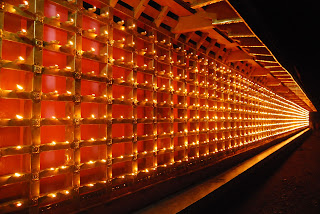 |
| rows of oil lamps, Kerala Hindu temple, pinrest.com |
Oil lamps, or deepam, hold a timeless significance in Hinduism, embodying the concepts of light, wisdom, and spiritual clarity. Lighting a lamp is a revered ritual symbolizing the triumph of light over darkness and knowledge over ignorance. This simple act is deeply spiritual, believed to cleanse the mind, dispel negativity, and foster an environment of positivity and harmony. For devout Hindus, lighting a lamp is not merely a tradition but a profound expression of devotion and connection with the divine. These small oil lamps, traditionally made of clay, symbolize the dispelling of darkness and the illumination of one's spiritual path. In the sanctified places of worship, Diyas help us cross the mundane stuff and show the path of spirituality to live a contended life.
 |
| brass oil lamp, India dreamline.com |
Symbolism in Hinduism
The flame of an oil lamp represents Agni (fire), one of the five Pancha Bhootas—the essential elements of the universe, alongside earth, water, air, and sky. Among these, fire is unique for its eternal purity, as it cannot be polluted. This inherent purity makes fire central to Hindu rituals. The glowing flame symbolizes hope, spiritual awakening, and energy, guiding devotees through life’s trials with renewed confidence.
In Hindu homes and temples, lamps are lit at dawn and dusk to align with natural cosmic cycles. These moments mark the transitions of the day, symbolizing renewal and balance. Light is considered an offering to the divine and a medium for invoking blessings, prosperity, and protection against malevolent forces.
Oil Lamps in Temples
Hindu temples are sanctuaries of light, with oil lamps burning perpetually in the sanctums. These lamps, crafted from brass or alloys of five metals, are either suspended or mounted on pedestals. They hold multiple wicks, often five or more, symbolizing various aspects of divinity. The main deity’s shrine typically has an elaborate lamp, while other deities are honored with smaller lamps.
During temple rituals, the lamp assumes an integral role. The aarti, a ceremonial offering of light, involves waving a hand-held oil lamp before the deity, accompanied by chants, hymns, and devotion. Large, multi-tiered lamps are often used during grand ceremonies, creating a mesmerizing display of divine illumination.
Homams and yagnas—fire rituals conducted in temple premises—further underscore the significance of Agni. Here, the oil lamp and sacred fire are considered conduits for divine communication. Only vegetable oils, particularly sesame oil, or ghee are used to maintain the ritual purity of these sacred flames.
Household Practices and Festivals
In Hindu households, the lamp is central to daily worship. Every evening, after 5:30 PM, a lamp is lit in the puja room, creating a serene and sacred ambiance. It is believed that this ritual dispels darkness, both physical and metaphorical, and brings peace and prosperity to the home.
 |
| Aarti, a typical Hindu prayer ritual, in.musafir.com |
 |
| earthen oil lamps, India, alamy.com |
Above image: Kartikai Deepam) an essential ancient Hindu festival linked to Agri /fire is observed mainly by Hindu Tamils, and also by adherents in the states of Kerala, Andhra Pradesh, Telangana, Karnataka, and also ln Sri Lanka. Mostly earthen oil lamps are used in the temples and homes during festival. Diyas are place before the deities at home and temples to seek blessings. In India lightning oil lamps has rich spiritual and religious connotation..........
Festivals like Deepavali (the Festival of Lights) and Karthikai Deepam highlight the cultural and spiritual importance of lamps. During Deepavali, homes and temples are adorned with countless lamps, symbolizing the victory of good over evil. Similarly, during Karthikai Deepam, millions of lamps are lit across Tamil Nadu, culminating in the lighting of the Mahadeepam atop the Arunachala hill in Tiruvannamalai, signifying the divine presence of Lord Shiva.
Oil Lamps Beyond Hinduism
 |
| In Judaism Menorah represents spiritual blessings /templeinstitute.org |
A Legacy of Light
Oil lamps, though less commonly used today due to electricity, remain an enduring symbol of spiritual illumination. Whether in a temple or a humble household, the flickering flame of an oil lamp connects devotees to the divine, fostering hope, purity, and unwavering faith. This simple yet profound tradition continues to light the spiritual path of millions, reaffirming the timeless essence of light in human life.
https://www.navrangindia.in/2020/08/oil-lamps-essential-part-of-hinduism.html









